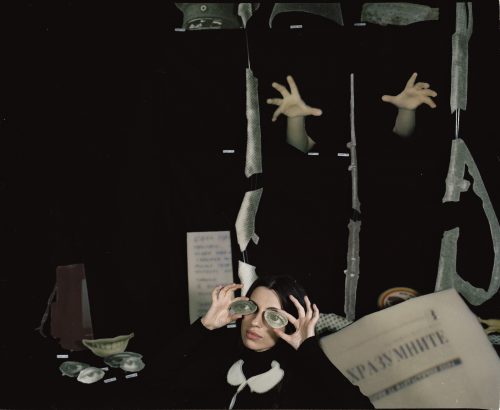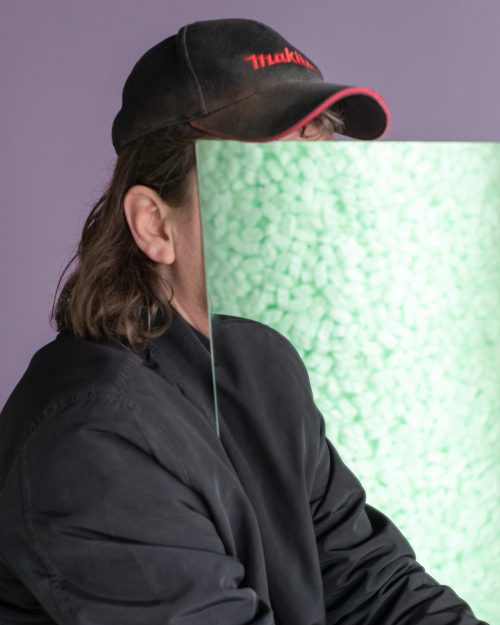
Groupshow
Wo ist der Morgen, den wir gestern sahen?
Project Info
- 💙 nova space
- 💚 Sophia Scherer
- 🖤 Groupshow
- 💜 Sophia Scherer, Hải Nam Nguyễn
- 💛 Jannis Uffrecht
Share on

Wo ist der Morgen, den wir gestern sahen?, exhibition view © 2024 nova space of Bauhaus-University Weimar, courtesy of the artists, photo: Jannis Uffrecht
Advertisement

Antonia Mang, Panne, 2022. Hatchback, glass, 96 x 130 cm © 2024 nova space of Bauhaus-University Weimar, courtesy of the artist, photo: Jannis Uffrecht

Wo ist der Morgen, den wir gestern sahen?, exhibition view © 2024 nova space of Bauhaus-University Weimar, courtesy of the artists, photo: Jannis Uffrecht

Antonia Mang, Bande, 2022. Ceramics approx. 30 x 10 cm (each) © 2024 nova space of Bauhaus-University Weimar, courtesy of the artist, photo: Jannis Uffrecht

Wo ist der Morgen, den wir gestern sahen?, exhibition view © 2024 nova space of Bauhaus-University Weimar, courtesy of the artists, photo: Jannis Uffrecht

Rebecca Rothenberg, All Talk, 2024. Mylar foil, helium, rubber coating spray, ink, weights, curling ribbon, dimensions variable © 2024 nova space of Bauhaus-University Weimar, courtesy of the artist, photo: Jannis Uffrecht

Eric Meier, VLLHLL, 2024. b/w archive pigment print, framed Edition 3+1AP, 100 x 80 cm © 2024 nova space of Bauhaus-University Weimar, courtesy of the artist, photo: Jannis Uffrecht

Wo ist der Morgen, den wir gestern sahen?, exhibition view © 2024 nova space of Bauhaus-University Weimar, courtesy of the artists, photo: Jannis Uffrecht

Eric Meier, Reffjuschie Kreises, 2019. Laser engraved mirrors, aluminium frame, 104 x 82 cm (4 parts, each 52 x 41cm) © 2024 nova space of Bauhaus-University Weimar, courtesy of the artist, photo: Jannis Uffrecht

Eric Meier, Reffjuschie Kreises, 2019. Laser engraved mirrors, aluminium frame, 104 x 82 cm (4 parts, each 52 x 41cm) © 2024 nova space of Bauhaus-University Weimar, courtesy of the artist, photo: Jannis Uffrecht

Karla Zipfel, Living together apart (Bad Krozingen), 2023. MDF, wood dust, sand, wood glue, acrylic paint, digital print series of 5, 70 x 50 x 7 cm (each) © 2024 nova space of Bauhaus-University Weimar, courtesy of the artist, photo: Jannis Uffrecht

Karla Zipfel, Living together apart (Bad Krozingen), 2023. MDF, wood dust, sand, wood glue, acrylic paint, digital print series of 5, 70 x 50 x 7 cm (each) © 2024 nova space of Bauhaus-University Weimar, courtesy of the artist, photo: Jannis Uffrecht

Wo ist der Morgen, den wir gestern sahen?, exhibition view © 2024 nova space of Bauhaus-University Weimar, courtesy of the artists, photo: Jannis Uffrecht

Christian Andrés Parra Sanchez, Salve, 2024. Ice letters, zinc buckets, LED light tubes, dimensions variable © 2024 nova space of Bauhaus-University Weimar, courtesy of the artists, photo: Jannis Uffrecht

Wo ist der Morgen, den wir gestern sahen?, exhibition view © 2024 nova space of Bauhaus-University Weimar, courtesy of the artists, photo: Jannis Uffrecht

Thái Tài Pham, Invisible Diaspora, 2021. Video, sound, decorative objects. Vietnamese & English subtitle. 6:03 Min © 2024 nova space of Bauhaus-University Weimar, courtesy of the artists, photo: Jannis Uffrecht

Eric Meier, Mocke, 2022. Fusioned booze bottles, 77 x 65 x 11 cm © nova space of Bauhaus-University Weimar, courtesy of the artist, photo: Jannis Uffrecht

Shelly Silver, Former East/Former West, 1994. Video, sound. German & English subtitles, 62 min © nova space of Bauhaus-University Weimar, courtesy of the artist, photo: Jannis Uffrecht

Rio Usui, The Sword, 2024. Acrylic coloured pencil on paper, 140 x 400 cm © nova space of Bauhaus-University Weimar, courtesy of the artist, photo: Jannis Uffrecht
Wo ist der Morgen, den wir gestern sahen?
23. August – 18. October .2024
Zuzanna Czebatul, Antonia Mang, Eric Meier, Christian Andrés Parra Sánchez, Thái Tài Pham, Rebecca Rothenborg, Shelly Silver, Rio Usui, Karla Zipfel
The exhibition Wo ist der Morgen, den wir gestern sahen? (Where is the tomorrow we saw yesterday?) explores in-between spaces, shades of grey or the possibility of a vacuum; with snapshots and scenarios of when systems threaten to collapse within these. In filmic, performative and sculptural contributions by students and teachers of the Bauhaus-Universität Weimar as well as external artistic positions, these limbo-like conditions are reflected materially and conceptually: in ruinous architectures, porous structures, fusion points and suspended moments. In doing so, the polyphonic perspectives of a young generation become visible, raising questions about democracy, the development of Western and Eastern European similarities and differences, the consequences of reunification and social dissonances of the past, present and future. The starting point of the exhibition is Shelly Silver‘s 1994 documentary film Former East/Former West, in which the US-American interviews former East and West Germans about their attitudes, behaviour and hopes regarding democracy, reunification and the future. The film, as a testimony to the time and also opens up approaches for reflection on the current political climate. The quote „Wo ist der Morgen, den wir gestern sahen?“ (’Where is the tomorrow we saw yesterday?’) is taken from a lyrical piece by Heiner Müller from 1975, which Alexander Kluge recontextualises in his extensive publication Das Jahr 1990 freilegen (2020). In doing so, he gives Müller‘s rather gloomy perspective a glimmer of hope. Currently, parts of society are experiencing dwindling trust in democratic institutions, a shift away from liberal values and polarised debate that impacts perception of yesterday, today and tomorrow. The artistic contributions are catalysts for critical thinking. They raise major questions as on how regressive tendencies and social disagreements can be overcome. They can act as democratic tools, that demand and promote a polyphonic resonance instead of nipping it in the bud.
Sophia Scherer, Hải Nam Nguyễn




